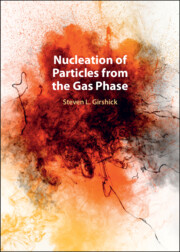Book contents
- Nucleation of Particles from the Gas Phase
- Reviews
- Nucleation of Particles from the Gas Phase
- Copyright page
- Dedication
- Contents
- Preface
- Symbols
- 1 Introduction
- 2 Single-Component Homogeneous Nucleation from a Supersaturated Vapor
- 3 Classical Nucleation Theory
- 4 Classical Theory of Multicomponent Nucleation
- 5 Classical Theory of Ion-Induced Nucleation
- 6 Atomistic Approaches to Homogeneous Nucleation
- 7 Transient Nucleation
- 8 Chemical Nucleation
- 9 Nucleation in Plasmas
- References
- Index
7 - Transient Nucleation
Published online by Cambridge University Press: 30 May 2024
- Nucleation of Particles from the Gas Phase
- Reviews
- Nucleation of Particles from the Gas Phase
- Copyright page
- Dedication
- Contents
- Preface
- Symbols
- 1 Introduction
- 2 Single-Component Homogeneous Nucleation from a Supersaturated Vapor
- 3 Classical Nucleation Theory
- 4 Classical Theory of Multicomponent Nucleation
- 5 Classical Theory of Ion-Induced Nucleation
- 6 Atomistic Approaches to Homogeneous Nucleation
- 7 Transient Nucleation
- 8 Chemical Nucleation
- 9 Nucleation in Plasmas
- References
- Index
Summary
In most experimental nucleation studies, it is assumed that steady-state nucleation exists, meaning that the time required to reach steady state is much shorter than the timescales for changes in temperature and saturation ratio. To examine this assumption, we solve the time-dependent equations for cluster number densities and nucleation currents, for clusters of each size. Assuming CNT values for condensation and evaporation rate constants, one finds that the time lag for achieving steady-state nucleation is typically on the order of microseconds. This is usually short enough to justify the steady-state assumption, a possible exception being systems such as rapid nozzle expansions. If instead atomistic values are used for rate constants, one finds that it may take much longer to achieve steady state. This is at least partially due to the multimodal nature of atomistic free energy profiles, with local minima corresponding to “magic numbers,” clusters that are more stable than clusters of adjacent sizes. The existence of magic numbers can significantly slow the approach to steady-state nucleation and may therefore invalidate the steady-state assumption in many cases.
Keywords
- Type
- Chapter
- Information
- Nucleation of Particles from the Gas Phase , pp. 145 - 165Publisher: Cambridge University PressPrint publication year: 2024



